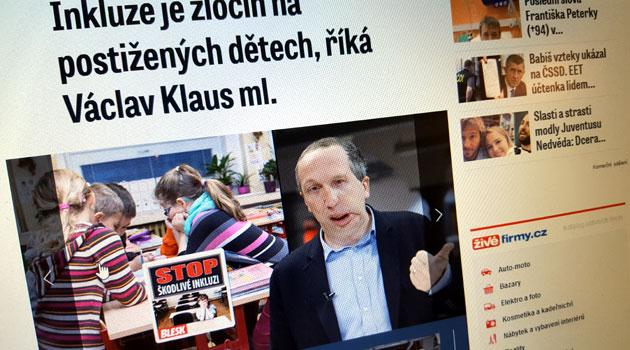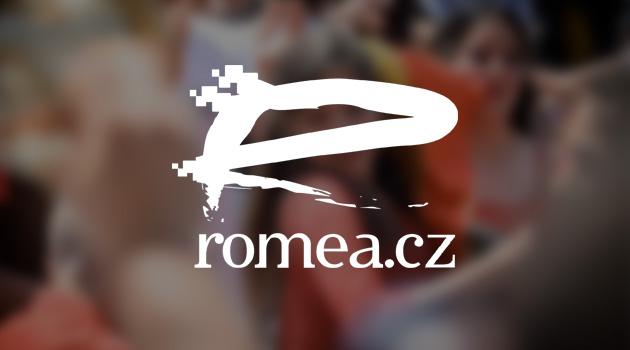The war against political correctness is a long-term process that was begun in the Czech Republic by ultra-right extremists during the 1990s. Their motive was apparent: They wanted to legitimize racism and xenophobia so their own “politics” would be acceptable to the broadest possible circle of voters.
That legitimization has de facto already happened, but more credible figures than former Republican Party chair Sládek and his fascist band had to get involved for that to be the case. Somewhere between 10 and 15 years ago, the campaign against political correctness became a component of the Czech mainstream discourse through several different intellectuals.
Their irresponsibility did not lie in the fact that they objected to political correctness – anybody has the right to do that – but in the fact that they were unable to imagine where their efforts at “free debate” might lead. While some of their claims may have been true in some aspects, the method they chose has led over time to a loss of respect for others, to repulsive forms of self-expression through the Internet, and to the absurdities and paradoxes of today.
Intellectuals fighting the incorrect fight
The first such intellectual in the Czech Republic was Petr Příhoda, a generally respected man, Christian educator, commentator, psychiatrist, and the director of the Institute of Medical Ethics at Charles University. People have trusted him and referred to him as a social authority (which, in many respects, he actually has been).
He has contributed a significant dose of demagoguery to the Czech public discussion of political correctness. For example, in the Catholic Weekly, he wrote the following in 2007: “We have just introduced political correctness. That bans us from speaking ‘indecently’ about Romani people. It is no longer advisable to say ‘Romani rent defaulter’, just ‘rent defaulters’. We are not to say that they are inadaptable, or that non-Romani citizens suffer in close coexistence with Romani people. These are just cosmetic adjustments. Their effect is sinister, they make free discussion of the full extent of our Romani problem impossible.”
The demagoguery here consists of the fact that none of this is true: Nothing of the sort was ever banned. Yes, if anybody said something like that about Romani people (or does so today) then that person must face an opposing opinion, but that cannot be labeled a “ban” – on the contrary, this has always been and still is about democratic discussion, to which there is no doubt that criticism and polemics belong.
What is dangerous are the generalizations that Příhoda has thoughtlessly aided the beginnings of here. Certainly, some Romani people (and some whites) are “inadaptable”, or live in ghettos, but one cannot say that about the rest of the Romani people living here, and not about the Romani people who live perfectly ordinary lives here.
The fact that some non-Romani citizens have sometimes suffered from living in close coexistence with some Romani people has been regularly written about and is still written about today, nobody has ever concealed that information. It is just necessary to add that other Romani people also suffer from coexisting with some Romani people, and that sometimes Romani people suffer from their close coexistence with some of their white neighbors.
All of those allegations taken together are true. To follow just a part of the truth, though, and to present it as the entre truth, is not worthy of an intellectual of Příhoda’s calibre, and I argued that with him at the time directly in the Catholic Weekly.
Democracy does not mean absolute rights
The main error of these intellectuals, however, has been and still is the conviction that freedom of speech must be absolute. Not only does it not have to be absolute, it cannot be absolute.
Beyond a certain boundary line, it is the case that the more freedom of speech becomes absolute, the less it becomes free and the more it becomes a caricature of itself. That boundary line is drawn today by the famous motto: “One person’s freedom ends where another person’s freedom begins.”
This is because, for example, one person can deny to another not just freedom, but also human dignity. This is not just a question of freedom of speech, but also of dignity (which is also emphasized by the Constitution) – so anybody who stands below somebody else’s window and shouts that he will shove that person into the gas chambers once he gets into power is crossing the line.
It is also a question of mutual self-preservation not to allow anybody to incite anybody else, through fanatical behavior (i.e., speech), to commit terrorist attacks. There is no doubt that extremists of all kinds are dangerous to democracy.
Crossing the line described here can lead to very tragic consequences, as the various totalitarian regimes of the 20th century (in addition to today’s terrorists) previously demonstrated. The German Nazis got to power in the 1930s through democratic means, and they abused their freedom to unleash the most destructive war in human history, to target people for murder and torture, to deny their dignity and freedom – beginning with their own citizens.
Freedom of speech, therefore, is regulated by law. The Charter of Fundamental Rights and Freedoms, which is a component of the constitutional order, states: “Freedom of speech and the right to seek and disseminate information may be restricted by law if such measures are essential in a democratic society to protect the freedoms and rights of others, the security of the state, public safety, public health and morals.”
Our laws regulating freedom of expression follow from that – primarily regulating the dissemination of hatred and slurs. For example, in the Criminal Code, they are Section 184 – Slander, Section 355 – Defamation of an ethnic, national, racial or other group, Section 356 – Incitement to hatred of a group of persons or to restrict their freedoms and rights.
Paradoxes of correctness
Other fighters against political correctness gradually joined Příhoda and other intellectuals here. They formed the front line of the effort.
From the wings, for many years, anonymous cowards and extremist loudmouths have been attacking anybody with a different opinion on the Internet, while the mainstream has been governed by the various intellectuals. Today the most visible soldiers battling political correctness are Václav Klaus, Jr.; Václav Krása, the chair of the National Council on Persons Living with Disabilities in the Czech Republic; the political scientist Petr Robejšek; and the politician Tomio Okamura.
According to Klaus, Jr., the Czech schools are becoming more and more infused with the ideology of political correctness. The infusion of instruction with themes based on European Union edicts, according to Klaus, Jr., means that what is being delivered otday is no longer education, but something closer to propaganda.
For his part, Václav Krása has criticized “political correctness” more than once, directly and indirectly. For example, he has reflected on it as follows: “The fumigation of reality can cause the opposite effect, because people are not stupid and they suspect that something is being hidden behind that cloud of smoke. Mr Yefim Fishtein asks an important question: Should the media be educating the population, do they have the right to fumigate reality, is political correctness the correct path at all? Is it correct to replace one concept with another?”
Both Klaus, Jr. and Krása are forgetting that political correctness actually personally benefits them both. Surely they would be insulted, for example, to read about themselves comments such as “That cripple is just playing at being clever” (Krása is a wheelchair user) or “Only those with crooked mouths get mad at the mirror” (Klaus, Jr. has a facial irregularity).
Here I have chosen examples of the gentlest forms of the abuse of which the Czech Internet is full – much cruder examples can be found. Thanks to political correctness, expressions such as “cripple” or the use of anybody’s appearance as an argument against them is no longer common today – or rather, is no longer socially acceptable.
The same could be said of Yefim Fishtein (whom I respect enormously), if anybody here were to write that a “kike” or a “Russky” like him shouldn’t be getting involved in things that don’t concern him. The same goes for the ideologically confused Okamura and Robejšek.
Robejšek, for example, could face recriminations such as “Go home, Hun!” because he has lived since 1976 in Germany and nobody knows whether he even has Czech citizenship or not. Okamura, who is part Japanese and part Korean, is in no better position – quite the opposite, slurs against people from Asia have long been in use in this country.
Yes, this is a paradox. Those doing battle against political correctness are the very people who have every reason to be grateful for it.
Incorrectness rules
Political correctness does have some distinct defects that are rarely discussed. Here on news server Romea.cz there has been an open discussion, more than once, about whether statistics should be kept about people of different ethnicities, an activity one might expect political correctness to prohibit.
Should we, for example, find out how many Romani people attend which schools, how many Romani people are employed, how many Romani people draw welfare (and how much), how many Romani people are in prison (and for breaking which laws), what the social situation is of Romani families living in ghettos, how much money they have to live on per day, and how they are coping with poverty? Journalist Patrik Banga agrees that the collection of data disaggregated by ethnicity should be introduced here.
From my perspective, the answer to this question is unequivocal, correctness or the lack thereof aside. I would introduce such statistics also.
If we want to actually aid the most impoverished Romani people and gradually integrate them into society, we should have the most detailed overview of their lives we can, otherwise their integration may stall or take longer than necessary (already now it’s clear that it will take at least two generations). All of this data, naturally, should be taken altogether, at all of the levels mentioned, not just focusing on crime or welfare, which would distort the situation.
Today, however, we have the opposite problem because so many intellectuals have lost their minds – and that is that political incorrectness now rules. Anybody in the Czech Republic who writes the truthful statement that a person who is racist is, in fact, racist is risking their own mental health, because they will be immediately attacked by both paid and unpaid abusers, disinformation promoters, informers, and the makers of threats.
It’s not that long ago that I was receiving, on a daily basis, several such offers to address my opinions by hanging me, or breaking my bones, or messages calling me a “black racist” and saying the (Czech) Ku Klux Klan was going to have to make an example of me. I don’t even want to discuss what the online discussions about racism were like that took place beneath my articles on that topic.
What is “normal”, today, is threatening others with death just because their opinion is different. The Czech Police have refused to pursue charges against those making such threats.
The same goes for the recent threat to burn down the ROMEA organization – in that case as well the police did not assess the threat as a crime and shelved the matter. The only consequence of the fight against political correctness is precisely this legitimization of racism and xenophobia.
The extremists, with the aid of many intellectuals, have ultimately achieved their aims, therefore. That is a paradox in and of itself.

